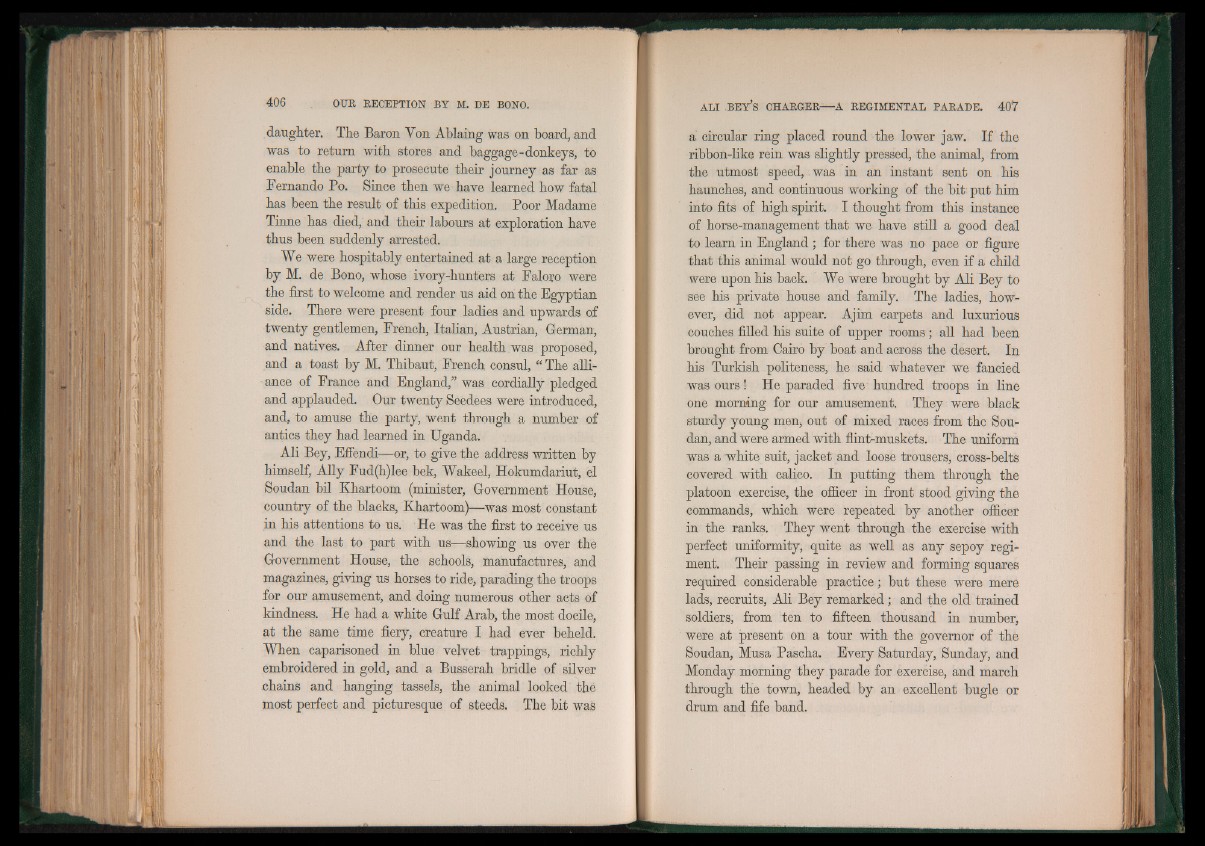
daughter. The Baron Yon Ablaing was on board, and
was to return with stores and baggage-donkeys, to
enable the party to prosecute their journey as far as
Fernando Po. Since then we have learned how fatal
has been the result of this expedition. Poor Madame
Tinne has died, and their labours at exploration have
thus been suddenly arrested.
We were hospitably entertained at a large reception
by M. de Bono, whose ivory-hunters at Faloro were
the first to welcome and render us aid on the Egyptian
side. There were present four ladies and upwards of
twenty gentlemen, French, Italian, Austrian, German,
and natives. After dinner our health was proposed,
and a toast by M. Thibaut, French consul, “ The alliance
of France and England,” was cordially pledged
and applauded. Our twenty Seedees were introduced,
and, to amuse the party, went through a number of
antics they had learned in Uganda.
Ali Bey, Effendi—or, to give the address written by
himself, Ally Fud(h)lee bek, Wakeel, Hokumdariut, el
Soudan bil Khartoom (minister, Government House,
country of the blacks, Khartoom)—was most constant
in his attentions to us. He was the first to receive us
and the last to part with us—showing us over the
Government House, the schools, manufactures, and
magazines, giving us horses to ride, parading the troops
for our amusement, and doing numerous other acts of
kindness. He had a white Gulf Arab, the most docile,
at the same time fiery, creature I had ever beheld.
When caparisoned in blue velvet trappings, richly
embroidered in gold, and a Busserah bridle of silver
chains and hanging tassels, the animal looked the
most perfect and picturesque of steeds. The bit was
a circular ring placed round the lower jaw. If the
ribbon-like rein was slightly pressed, the animal, from
the utmost speed, was in an instant sent on his
haunches, and continuous working of the bit put him
into fits of high spirit. I thought from this instance
of horse-management that we have still a good deal
to learn in England ; for there was no pace or figure
that this animal would not go through, even if a child
were upon his back. We were brought by Ali Bey to
see his private house and family. The ladies, however,
did not appear. Ajim carpets and luxurious
couches filled his suite of upper rooms; all had been
brought from Cairo by boat and across the desert. In
his Turkish politeness, he said whatever we fancied
was ours! He paraded five hundred troops in line
one morning for our amusement. They were black
sturdy young men, out of mixed races from the Soudan,
and were armed with flint-muskets. The uniform
was a white suit, jacket and loose trousers, cross-belts
covered with calico. In putting them through the
platoon exercise, the officer in front stood giv in g the
commands, which were repeated by another officer
in the ranks. They went through the exercise with
perfect uniformity, quite as well as any sepoy regiment.
Their passing in review and forming squares
required considerable practice; but these were mere
lads, recruits, Ali Bey remarked; and the old trained
soldiers, from ten to fifteen thousand in number,
were at present on a tour with the governor of the
Soudan, Musa Pascha. Every Saturday, Sunday, and
Monday morning they parade for exercise, and march
through the town, headed by an excellent bugle or
drum and fife band.